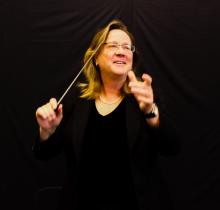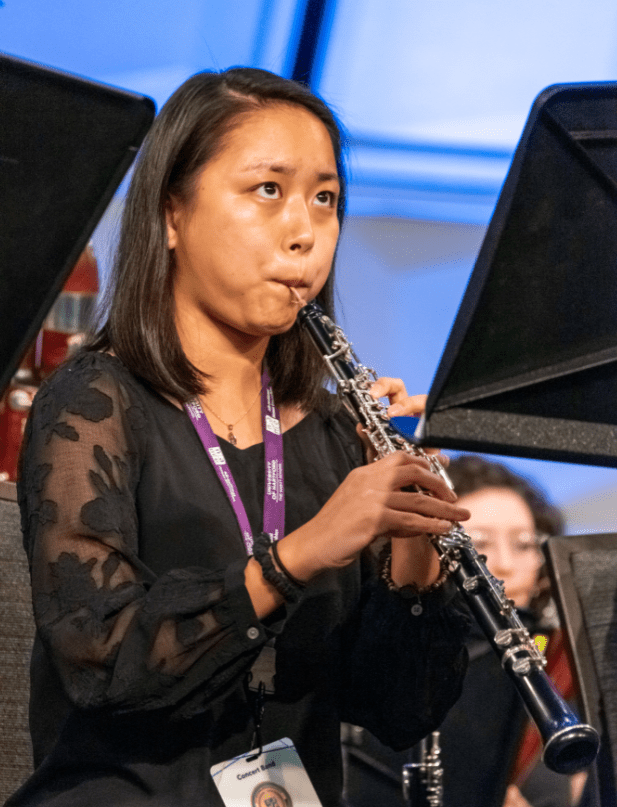/ News Posts / Effective and Organized Learning Processes in Music Practice
They Have to Practice without You Now
Effective and Organized Learning Processes in Music Practice
By NAfME Member Kim Mieder, PhD
Music students often struggle with practicing alone effectively and productively. Directors sometimes assume that students will pick up how to practice by applying strategies demonstrated in ensemble rehearsals, but this is rarely the case. Research suggests that young players tend to lack the skills necessary to effectively navigate an organized learning process and often demonstrate unproductive practice behavior (McPherson & Zimmerman, 2002; Oare, 2012; Mieder & Bugos, 2017).

Photo: Bob O’Lary
Effective and Organized Learning Processes in Music Practice
- Error detection
- Adjusting and self-monitoring
- Focused goal setting
- Applying appropriate practice strategies
- Reflecting
Most Prevalent Practice Behavior
- Repetition without thoughtful intent
- Irrelevant playing
- Lack of focus or problem-solving strategies
Amidst a global pandemic, music educators are challenged to engage music students in a virtual world. Although supported by many great music software programs, students now have an opportunity to become vastly more musically independent. Teaching students how to practice will provide the tools necessary for them to self-monitor their thoughts and behaviors while gaining confidence in their ability to learn. Music directors can start the process by teaching students three simple yet very important steps in all learning endeavors.
Plan—Practice—Reflect
Plan
Instruct students to first state a practice goal or several goals. Have them support these thoughts by describing their musical challenges. Encourage them to work on small passages and chunks before moving on. Students then choose practice strategies from a list that you provide and have gone over with them. Encourage students to write down a simple explanation of why they chose the strategies that they did. This will assist in the development of their self-monitoring and problem-solving skills.
Practice
Self-monitoring techniques that support practice strategies:
- Play through short sections of your music using repetition thoughtfully.
- Always keep a moderate tempo so you can assess things like:
- Rhythm Accuracy
- Articulation
- Dynamics
- Pitch and Tone
- When applying a strategy, always start slowly and increase tempo gradually.
- If you take a musical element out of context, put it back slowly and gradually.
Reflect
Encourage students to briefly reflect after their practice session using the following prompts:
- Was my practice session productive? Explain why it was or was not.
- Did I meet my practice goal sufficiently?
- What could I have done to be even more productive?
- What goals should I set for the next session?

The 2019 NAfME All-National Honor Ensembles Jazz Ensemble performed under the direction of Todd Stoll of Jazz at Lincoln Center with guest soloist Camille Thurman in Orlando, Florida. Photo by Bob O’Lary.
Suggested Music Practice Strategies
This is a partial list of accessible practice strategies that I derived from research concerning the practice behavior of pianists and wind players (Smith, 2005; Bugos & High, 2009). For better understanding of the application of each strategy, they are presented in three categories: Element Elimination, Thoughtful Repetition, and Make It Musical.
Take It Out of Context / Element Elimination
- Take out the articulation; alter the rhythm to increase or lesson the challenge.
- Play a passage or entire selection in straight quarter notes to focus on pitch and fingering.
- Sizzle and finger the notes while adhering to dynamics and articulation.
- Play it backwards and mental practice
Thoughtful Repetition
- Repeat one measure, small sections, or from beginning to end.
- Chaining / Whole Part Whole / Woodshedding
- Use the Metronome Effectively
- Know where the pulses fall in each measure.
- Understand what note value receives the beat.
- Set the metronome either to the pulse or a subdivided pulse.
Make It Musical
- Experiment with dynamics, tone color, and tempo variation.
- Listen to recordings of various artists performing the music.
- Explore numerous ways to speak a musical sentence or sequence of thoughts.
Teaching your students how to practice will empower them with the independence they really need right now due to distance learning. Start with demonstrating the various practice strategies using a unison etude in their method book or even scales and techniques repertoire. Then have them write out a Plan, Practice with thoughtfully chosen strategies, and Reflect. Feel free to contact me with questions and other ideas such as cooperative group activities and learner-centered teaching approaches that will assist in building your students’ musical independence.
References
Bugos, J. A, & High, L. (2009). Perceived versus actual practice strategy used by older adult novice piano students. Visions of Research in Music Education, 14. Retrieved from http://www-usr.rider.edu/~vrme/
McPherson, G. E., & Zimmerman, B. J. (2002). Self-regulation of musical learning: A social cognitive perspective. In R. Colwell & C. Richardson (Eds.), The New Handbook of Research on Music Teaching and Learning (pp. 327–347). New York, NY: Oxford University Press.
Mieder, K., Bugos, J. (2017). Enhancing self-regulated practice behavior in high school instrumentalists. International Journal of Music Education (35)4, 578–587.
Oare, S. (2012). Decisions made in the practice room: A qualitative study of middle school students’ thought processes while practicing. UPDATE: Applications of Research in Music Education, 30(2), 63–70.
Smith, B. (2005). Goal orientation, implicit theory of ability, and collegiate instrumental music practice. Psychology of Music, 33(1), 36–57.
About the author:
 Dr. Kim Mieder is the Assistant Professor of Music and Coordinator of Music Education at Sonoma State University. She leads the music teacher credential candidate course study, supervises student teachers, instructs Music Education majors in various areas of pedagogical methodology, presents lecture courses in European and American Music, and co-teaches and guest conducts in the university concert band. Dr. Mieder is a five-time nominee of “Who’s Who in American Teachers,” previously serving as director of bands, orchestra, and piano studies at the elementary, middle, and high school level in Hillsborough County, Florida, for 20 years. Her concert, jazz, orchestral ensembles, and marching bands have consistently received superior honors at district music performance assessments.
Dr. Kim Mieder is the Assistant Professor of Music and Coordinator of Music Education at Sonoma State University. She leads the music teacher credential candidate course study, supervises student teachers, instructs Music Education majors in various areas of pedagogical methodology, presents lecture courses in European and American Music, and co-teaches and guest conducts in the university concert band. Dr. Mieder is a five-time nominee of “Who’s Who in American Teachers,” previously serving as director of bands, orchestra, and piano studies at the elementary, middle, and high school level in Hillsborough County, Florida, for 20 years. Her concert, jazz, orchestral ensembles, and marching bands have consistently received superior honors at district music performance assessments.
Dr. Mieder is a published author in both international research and state music journals, and she has co-authored several book chapters pertaining to the topic of adolescent self-regulation in music learning. She is an adjudicator and clinician for high school and middle school ensembles, offering her “Self-Regulated Learning Curriculum in the Full Ensemble Rehearsal” to enhance adolescent self-efficacy, ensemble performance outcomes, music practice strategy use, and meta-cognition. She is the Conductor and Founding Program Director for Noma Winds, a Sonoma County educational community outreach program for High School Instrumentalists that also provides a training ground for Music Teacher Credential Candidates through Service-Learning. She received her degrees in Music Education from Florida State University (B.A.), University of South Florida (M.A.) and (PhD) in music education. You can reach her at Mieder@sonoma.edu.
Did this blog spur new ideas for your music program? Share them on Amplify! Interested in reprinting this article? Please review the reprint guidelines.
The National Association for Music Education (NAfME) provides a number of forums for the sharing of information and opinion, including blogs and postings on our website, articles and columns in our magazines and journals, and postings to our Amplify member portal. Unless specifically noted, the views expressed in these media do not necessarily represent the policy or views of the Association, its officers, or its employees.
September 3, 2020. © National Association for Music Education (NAfME.org)
Published Date
September 3, 2020
Category
- Educational Topics
Copyright
September 3, 2020. © National Association for Music Education (NAfME.org)




